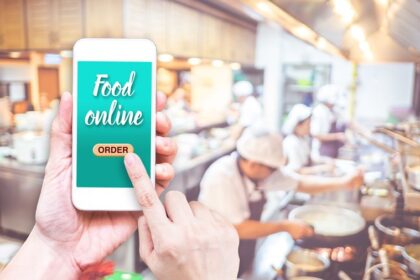
Since I stay alone, I often order food through online food delivery services like Zomato or Swiggy particularly on holidays…But the inspiration to write this article was when I visited a restaurant in Trivandrum for lunch where I had gone as part of my daughters admission process. While there was hardly one or two walk-in customers the restaurant was swarming with Zomato and Swiggy delivery boys…at least 8 to 9 of these delivery boys were there at the restaurant at any point in time…
A recent study by the Indian Brand Equity Foundation concluded that India’s food delivery market alone is worth $15 billion today. In yet another study, conducted by business consultancy firm Market Research Future, it was found that the food delivery market of the country is likely to grow at over 16 per cent annually and touch $17.02 billion by the year 2023
The ease and the options that they provide that it provides has already made online food delivery a darling in most Indian cities… something that people wouldn’t have imagined years ago… but this growth in online food delivery is leading to yet another disruptive phenomenon …“Cloud kitchens”…
So what are Cloud Kitchens?
A cloud kitchen is primarily a restaurant kitchen that only accepts incoming orders through an online ordering system and doesn’t offer a dine-in facility. While the trend of calling a nearby restaurant and getting your order at home has become fairly old now, the influx of companies like Swiggy, Zomato and Foodpanda have reshaped the whole online food ordering scenario in a rather structured way.
We now live in an era of ordering right from our mobile phone and getting it at our exact location. Most of these online portals have teamed up with existing restaurants to ease the ordering process and expand their profits.
With a noticeable shift of consumers to the online food ordering platforms, we see multiple new players trying to gain some hold of the market. Some of the recent names joining the bandwagon include:
1. Future Group – The giant will soon start its cloud kitchen vertical that will be first rolled out in Bangalore. Future Group is India’s biggest brick-and-mortar retailer and is expecting to increase the revenue contribution of food business to nearly 50% in the coming future. Interestingly, the company owns Galaxy Entertainment Corporation, which supplies to a dozen commissaries and supplies to live kitchens in Big Bazaars. The company may look at expanding it.
2. UberEats – The San-Francisco based cab aggregator, Uber, launched its food delivery vertical in India in May 2017. The operations first began in Mumbai, now spread over many cities. The company aspires to deliver convenience, reliability and a wide selection. They even look forward to provide their restaurant partners with a provision to start their own kitchens in the near future.
3. Ola-Foodpanda Integration– Ola cabs announced the integration of Foodpanda in its mobile app in 2018. To recall, Ola acquired Foodpanda India in December 2017 in exchange for Ola Stocks. The company, at the time, also announced that $200 million (roughly Rs. 1,439 crores) would be invested into the food delivery aggregator to boost its presence, a move that is showing substance on ground now with Foodpanda offering hefty discounts for orders on its platform.
So what are the factors favoring the growth of cloud kitchens?
- Since there is no requirement for a premium location a lot of cost saving on rentals is made particularly in metro cities.
- The home delivery trend, which is rapidly gaining momentum and giving jerks to the revenue of fine dining restaurants, primarily because of the shift in customer preference and an increased sense of hassle in dining out. After a day’s hard work, people don’t want to get stuck in hour-long traffic just to get to their favourite restaurants; they rather prefer relishing their favourite cuisines in the comforts of their homes watching their favourite flick or web series.
- Proper marketing and advertising is essential because it is a single source of obtaining orders. Since the overall cost gets cut (location or maintenance cost), companies often invest a good amount on their marketing and promotions. Zomato is a classic example of this.
- Today’s generation needs a mix of physical and digital presence and phy-digital is the way to go. The idea is to create a differentiated experience of visual restaurants and cater to multiple needs of consumers.
- Today, social media advertising plays a major role influencing a person’s decision. It works well in favour of such online portals. With social media at its peak today, brands chart out a separate and extensive social media strategy. These platforms are a great way to interact, reach out to consumers, address feedbacks and convert followers to loyalists.
- The ease of operation provided by apps like Zomato which includes range of restaurants, ordering process, ease of payment options and online updates on delivery make the whole process very easy to operate and make more and more people take to online food delivery options.
The coming trend also includes the following:
- Deliveroo, a online food ordering portal has introduced their own dark kitchens into play by naming them as ‘Deliveroo’s editions’ to focus on delivering best food to the customers on time without any compromise.
- With introductions of such “dark kitchens” as they are otherwise called by food delivering portals, they create a monopoly market where the customers get to order from the portal’s very own kitchens and deliver them with more priority when compared to other restaurants listed out.
- In India, Redbox introduced small kiosk in multiple parts of the city aiming to run as a takeaway & delivery only kitchen. With very less menu options and faster delivering times, Redbox also became one of the successful kitchens out there. Similarly, Swiggy also launched cloud kitchen in few cities to accelerate their sales and get involved in cloud kitchen concept.
So what are few Pros and cons of a Cloud Kitchen?
Pros:
- Low operation cost
- High-profit margins
- Less risk
Cons:
- Online only visibility
- Challenging brand building
- Less customer interaction
Technology has also been a big driving force in the growth of online food delivery and hence Cloud kitchens. Future development of technology which enable more and more personalized services and improvements in key deliverables by using robot deliveries, voice ordering and drone deliveries etc. enabling further growth of this sector
The area is also likely to see a lot more partnerships like the case of OYO & Café Coffee Day (partnered with Freshmenu and Ubereats respectively), and creating more supply and delivery combinations which will enable more and more options for the customers and hence enabling more growth of the industry…
So, the new business concept is not taking market share away from current restaurant owners but only expanding the consumer base making it a win-win situation. In future, these cloud kitchen outlets might not just remain B2C but may also become a B2B venture. These centralized cooking hubs say, observers, may well support dine-in restaurants with food.
In a country like India with rising income and almost every family shifting to both partners working the trend of online food delivery and hence cloud kitchens are only bound to increase…
We are indeed living in the era of disruption…



